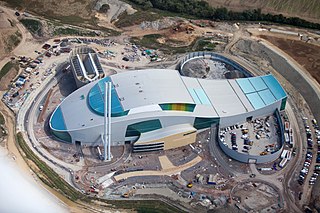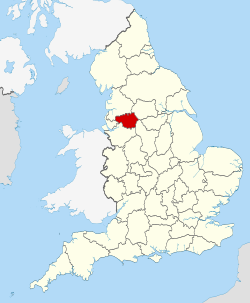
Waste management or waste disposal includes the processes and actions required to manage waste from its inception to its final disposal. This includes the collection, transport, treatment and disposal of waste, together with monitoring and regulation of the waste management process and waste-related laws, technologies, economic mechanisms.

A landfill site, also known as a tip, dump, rubbish dump, garbage dump, or dumping ground, is a site for the disposal of waste materials. Landfill is the oldest and most common form of waste disposal, although the systematic burial of the waste with daily, intermediate and final covers only began in the 1940s. In the past, refuse was simply left in piles or thrown into pits; in archeology this is known as a midden.

Viridor Ltd is a recycling, renewable energy and waste management company in the United Kingdom, owned by KKR.

Zero waste is a set of principles focused on waste prevention that encourages redesigning resource life cycles so that all products are reused. The goal of this movement is to avoid sending trash to landfills, incinerators, or the ocean. Currently, only 9% of global plastic is recycled. In a zero waste system, the material will be reused until the optimum level of consumption is reached. The definition adopted by the Zero Waste International Alliance (ZWIA) is:
Zero Waste: The conservation of all resources by means of responsible production, consumption, reuse and, recovery of all products, packaging, and materials, without burning them and without discharges to land, water, or air that threaten the environment or human health.
Articles related to waste management include:

Municipal solid waste (MSW), commonly known as trash or garbage in the United States and rubbish in Britain, is a waste type consisting of everyday items that are discarded by the public. "Garbage" can also refer specifically to food waste, as in a garbage disposal; the two are sometimes collected separately. In the European Union, the semantic definition is 'mixed municipal waste,' given waste code 20 03 01 in the European Waste Catalog. Although the waste may originate from a number of sources that has nothing to do with a municipality, the traditional role of municipalities in collecting and managing these kinds of waste have produced the particular etymology 'municipal.'

Refuse-derived fuel (RDF) is a fuel produced from various types of waste such as municipal solid waste (MSW), industrial waste or commercial waste.
A mechanical biological treatment (MBT) system is a type of waste processing facility that combines a sorting facility with a form of biological treatment such as composting or anaerobic digestion. MBT plants are designed to process mixed household waste as well as commercial and industrial wastes.
In the UK a local authority waste disposal company (LAWDC) is an arms length waste management operator. These companies were created when the waste management industry was privatised. Some of these companies have now been sold on to larger commercial waste companies and some are still owned by local authorities.

In 2015, 43.5% of the United Kingdom's municipal waste was recycled, composted or broken down by anaerobic digestion. The majority of recycling undertaken in the United Kingdom is done by statutory authorities, although commercial and industrial waste is chiefly processed by private companies. Local Authorities are responsible for the collection of municipal waste and operate contracts which are usually kerbside collection schemes. The Household Waste Recycling Act 2003 required local authorities in England to provide every household with a separate collection of at least two types of recyclable materials by 2010. Recycling policy is devolved to the administrations of Scotland, Northern Ireland and Wales who set their own targets, but all statistics are reported to Eurostat.
The California Department of Resources Recycling and Recovery is a branch of the California Environmental Protection Agency that oversees the state's waste management, recycling, and waste reduction programs. CalRecycle was established in 2010 to replace the California Integrated Waste Management Board. It is known for administering the California Redemption Value (CRV) program, among other responsibilities.

Demolition waste is waste debris from destruction of buildings, roads, bridges, or other structures. Debris varies in composition, but the major components, by weight, in the US include concrete, wood products, asphalt shingles, brick and clay tile, steel, and drywall. There is the potential to recycle many elements of demolition waste.

Source-separated organics (SSO) is the system by which waste generators segregate compostable materials from other waste streams at the source for separate collection.

Tyldesley Little Theatre is a small theatre in Lemon Street, Tyldesley, Greater Manchester, England. It is the home of a local amateur dramatic society, which mounted its first production at the theatre in 1921. The theatre has been described as 'one of the few remaining authentic back street theatres'.
Solid waste policy in the United States is aimed at developing and implementing proper mechanisms to effectively manage solid waste. For solid waste policy to be effective, inputs should come from stakeholders, including citizens, businesses, community-based organizations, non-governmental organizations, government agencies, universities, and other research organizations. These inputs form the basis of policy frameworks that influence solid waste management decisions. In the United States, the Environmental Protection Agency (EPA) regulates household, industrial, manufacturing, and commercial solid and hazardous wastes under the 1976 Resource Conservation and Recovery Act (RCRA). Effective solid waste management is a cooperative effort involving federal, state, regional, and local entities. Thus, the RCRA's Solid Waste program section D encourages the environmental departments of each state to develop comprehensive plans to manage nonhazardous industrial and municipal solid waste.
The San Francisco Mandatory Recycling and Composting Ordinance is a local municipal ordinance requiring all persons located in San Francisco to separate their recyclables, compostables and landfilled trash and to participate in recycling and composting programs. Passed by the San Francisco Board of Supervisors in 2009, it became the first local municipal ordinance in the United States to universally require source separation of all organic material, including food residuals.
The Newby Island Landfill (NISL) is one of the largest active landfills on the shores of the San Francisco Bay. It is located in Santa Clara County, California in the United States. The site is located within the city limits of San Jose, California at the western terminus of Dixon Landing Road. The address is 1601 Dixon Landing Road, Milpitas. Although the address and public street access to the site are both in the City of Milpitas, the landfill property is entirely within the City of San Jose. Newby Island Landfill has a length of 5.07 km (3.15 mi). It is located West of the City of Milpitas near Dixon Landing Road and Interstate 880. It is the terminus for waste for all of San Jose (62%), Santa Clara (14%), Milpitas (10%), Cupertino (5%), Los Altos (2%) and other cities (7%). The 342-acre pile is currently permitted to operate until 2041 and may extend up to 245 feet. The landfill is an island surrounded by a levee which keeps its runoff from directly entering the bay, and the water that drains from it is treated in the landfill's own treatment plant. Electricity for the landfill is generated by burning the methane collected from the decomposition of the waste. Dried sewage sludge from the nearby San José–Santa Clara Regional Wastewater Facility is the material used as cover, mixed in with the trash, blending San Jose's waste streams. It is operated by Republic Services (Republic), which, along with Waste Management Incorporated, transports and disposes of most of the household trash in the United States.

Food waste recycling is a process to convert food waste into useful materials and products for achieving sustainability of the environment. Food waste is defined as all parts of food, inedible and edible, created before, during, and after food processing, production, and consumption. Greenhouse gases, especially methane can be reduced by food waste recycling. Food waste recycling can also alleviate the saturation of landfill sites in Hong Kong.
The West London Waste Authority is the statutory body responsible for waste disposal in the London boroughs of Brent, Ealing, Harrow, Hillingdon, Hounslow and Richmond upon Thames. The authority was formed in 1986, taking over functions previously held by the Greater London Council, and is overseen by an elected councillor from each of the boroughs in which it operates.











